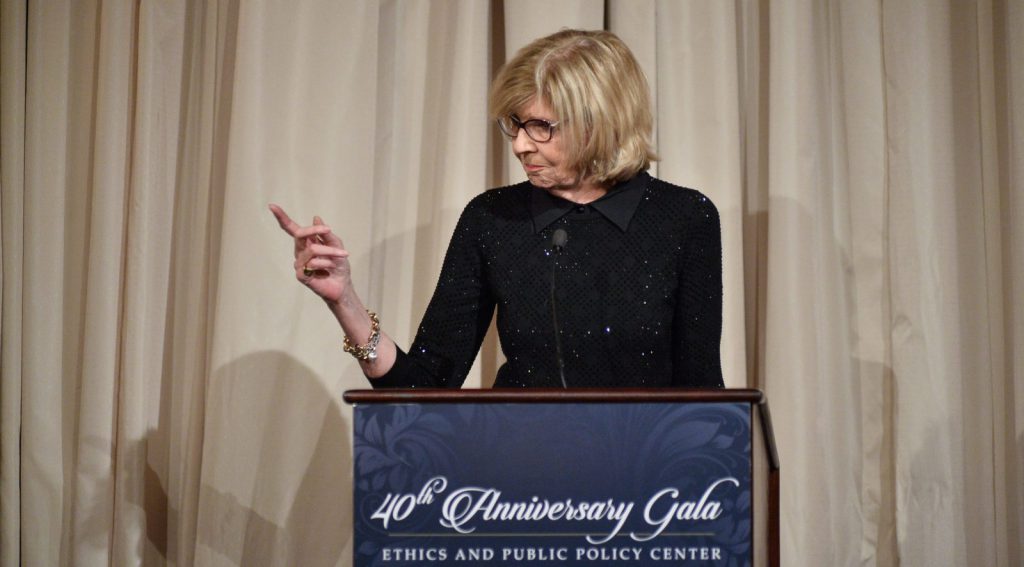
Published April 25, 2017
Several EPPC scholars published remembrances of Kate O’Beirne at National Review Online, following her death on April 23, 2017. As shown in the above photo, Ms. O’Beirne gave celebratory remarks at EPPC’s 40th anniversary gala in April 2016.
ED WHELAN
I can do no better than to endorse the many beautiful tributes to the extraordinary Kate O’Beirne that have already been written, including those by Ramesh Ponnuru, April Ponnuru, and Mona Charen. But let me offer a few observations.
When I first entered the outer orbit of the National Review world a dozen years ago, Kate had long been a dazzling star whom I had admired from afar. I might well have been daunted to approach her. But Kate instead generously befriended me. I immediately discovered how delightful, intelligent, and down to earth she was. I’m so grateful that my wife and I had many occasions over the years to talk and laugh with Kate (including at the Ethics and Public Policy Center’s 40th-anniversary gala just last year, which she highlighted with lavishly celebratory remarks punctuated by her wry humor). How I wish for one time more.
Some years ago, I took part in an amazing program in Rome — a sort of deeper look at the Vatican — for a group of twelve or so journalists. (I happily endured the label for the sake of the trip.) Kate was one of the leaders of the program. Over the course of a week, we visited the great basilicas of Rome, toured the Scavi and the Sistine Chapel, met with Vatican officials, had every meal together, and attended Mass each day at sites from the crypt of Saint Peter’s to the catacombs. Although Kate had done it all before, her joy and awe were fresh. She combined a humble reverence for that which deserved revering with a withering irreverence for that which didn’t.
More broadly, Kate’s deeply Catholic sensibility infused her life. The “tough broad” pose she sometimes feigned sheltered her gentle heart. She found and shared amusement in the foibles that we imperfect human beings all have, even as she loved others with (and not merely despite) our many faults. She put her ultimate faith not in the things of this world but in those of the next.
May Kate’s soul rest in peace, and may her beloved husband Jim, their two sons she adored, and her extended family be consoled in their grief.
—Ed Whelan is president of the Ethics and Public Policy Center and a regular contributor to National Review’s Bench Memos blog.
YUVAL LEVIN
I first encountered Kate O’Beirne on television, as a teen-aged political junky watching CNN in the ‘90s, and I thought that she must be an awfully intimidating presence in person. She was sharp, quick, and had no patience for BS.
But when I met Kate, and got to know her a bit, I realized that in person she was even more impressive precisely because she wasn’t intimidating.
She was one of the most persuasive people I’ve ever encountered because she would argue by putting you in her shoes as she became persuaded of something. She almost used humility as a weapon. She would engage in conversation by describing herself as just an observer who happened on the scene but was sure impressed with some of what she was hearing — just not all. After a few minutes of selective extravagant praise for some idea (and especially for the person delivering it) mixed very carefully with just a touch of keen, biting criticism for any alternatives, you found yourself utterly convinced she was right without ever really noticing that she had a strong opinion to begin with.
But that self-effacing way of engaging the world wasn’t for show. This was always what struck me most about Kate in person: It wasn’t about her. She didn’t stand in her own way, always blocking her view. She was focused outward in a way that’s all too rare, and this made her not only a supremely decent person but also an extremely good judge of situations and especially of people. She saw right through people, always ready with a short, witty, instant character profile — and not only of politicians. She had my kids’ personalities figured out the minute she met them.
Kate knew that everyone was only human, and so needed to be deflated when they got too puffed up (and boy was she good at that), but also lifted up when they fell too low. She had a keen sense of justice, a deep instinct for loyalty to her friends, and a joyous sense of humor, all rooted in her abiding Catholic faith.
I was lucky to know her. We were lucky to have her. But that only makes it harder to say goodbye. RIP.
—Yuval Levin is editor of National Affairs and the Hertog Fellow at the Ethics and Public Policy Center.
MARY HASSON
Kate O’Beirne was like a warm fire, crackling with humor and wit, in the center of the room. Her light and energy radiated outward, seamlessly connecting everyone within range. At noon on Divine Mercy Sunday, the Lord took her home. But while her fire has flickered out here on earth, I expect she’s lighting up the communion of saints in much the same way.
I knew of Kate before I knew her. I admired her clear thinking, her crisp writing, and her tell-it-like-it-is political analysis. But, perhaps unlike most people in Washington, D.C., I got to know Kate first in a “mom-to-mom” context. Our sons became close friends in high school and later, with a group of great guys, shared a house after college. During those years, even as Kate was taking on liberal commentators on CNN’s Capital Gang and crafting conservative messages as National Review’s Washington editor, our conversations — on soccer sidelines, at school events, and in D.C. social gatherings — centered mostly on the people she loved so dearly, her husband and sons, and then later her daughter-in-law and grandchildren. She was a feisty political player, but even more, she was a woman who fiercely loved her God, her family, and the Church.
As the years passed, our work overlapped in shared zeal for the Church and concern for the culture. Kate’s wisdom and experience were deep; three attributes in particular stand out. First, she was a talent-spotter. Not just in the usual way of recognizing and nurturing a fresh young writer, for example, or a young conservative eager to change the world, but in a richer sense: She unfailingly looked for and encouraged the specific gifts of the people before her, whether a mom at home raising great kids, a priest ministering to the spiritual needs of many, or the law enforcement or military person steadfastly doing his duty. Second, she was a champion promoter — of others. In a city too often characterized by the twin sisters of ambition and envy, Kate was the exception. She promoted others’ good works as they were her own, boasting of their achievements and taking delight in bringing good people together. Her life was a happy witness to her belief that by connecting good people, even more good would happen. Third, she was straightforward, unflinchingly so, on matters of faith. What “everyone” thinks matters very little, if we don’t get things right with God. Kate had the confidence of one who knows that the only audience that really matters is an audience of One.
Farewell, Kate, and Godspeed.
—Mary Rice Hasson is a fellow at the Ethics and Public Policy Center and editor of Promise and Challenge: Catholic Women Reflect on Feminism, Complementarity, and the Church.
MONA CHAREN
Yesterday, as she lay in a hospital bed surrounded by adoring family and friends, I was able to say goodbye to my dear friend Kate O’Beirne. Breathing had become difficult, and she wore an oxygen mask. Her two handsome and devoted sons, her “saintlike” (her word) husband Jim, and her three sisters were there, along with the friends who couldn’t stay away. It’s the only time I’ve ever been in a room with Kate that she didn’t say anything witty.
Kate O’Beirne was brilliant and hilarious and generous and good. Her personality was radiant. She spoke fast, and would often introduce new information with ”as you know.” But few knew as much as she. It just one of her stylistic accommodations to the reality that practically no one could keep up.
When she was a law student interviewing for a firm, a partner asked her where she pictured herself in 10 years. “Five years older,” she winked. Speaking of a prominent Republican politician who was on his third wife, she quipped “When a man marries his mistress, he creates a job opening.”
There are countless examples of her sterling wit, and her quite deep wisdom. She lit up every gathering, and enlivened every conversation. Never once did she pick up the phone without making you feel that the one thing in the world she most wanted was to speak to you at that moment.
Unlike so many who become famous, Kate never let it go to her head. She was plugged in and seemed to know everyone, but her self-esteem didn’t rely on being known. This woman was grounded in the permanent things: her family, her church, and her friends. The hole she leaves in our lives and hearts is vast. RIP.
Mona Charen is a senior fellow at the Ethics and Public Policy Center.








